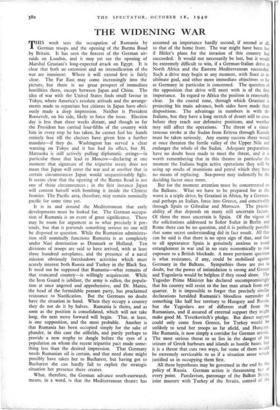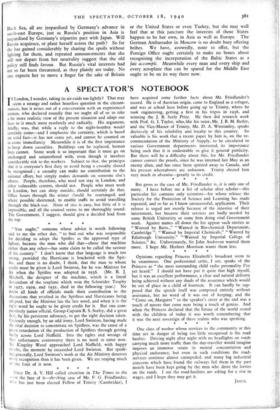THE WIDENING WAR
THIS week sees the occupation of Rumania by German troops and the opening of the Burma Road by Britain. It has seen the fiercest of the German air- raids on London, and it may yet see the opening of Marshal Graziani's long-expected attack on Egypt. It is clear that both an extension and an intensification of the war are imminent. Where it will extend first is fairly clear. The Far East may come increasingly into the picture, but there is no great prospect of immediate hostilities there, except between Japan and China. The idea of war with the United States finds small favour in Tokyo, where America's resolute attitude and the arrange- ments made to repatriate her citizens in Japan have obvi- ously made a deep impression. Neither is President Roosevelt, on his side, likely to force the issue. Election day is less than three weeks distant, and though -so far the President has carried four-fifths of the country with him in every step he has taken, he cannot feel his hands entirely free till the electors have given him a further mandate—if they do. Washington has served a clear warning on Tokyo and it has had its effect, but M. Matsuoka is still actively pulling diplomatic strings—in particular those that lead to Moscow—declaring at one moment that signature of the tripartite treaty does not mean that Japan will enter the war and at another that in certain circumstances Japan would unquestionably fight. It seems clear that the opening of the Burma Road is not one of those circumstances ; in the first instance Japan will content herself with bombing it inside the Chinese frontier. The Pacific area, therefore, may remain nominally pacific for some time yet.
It is in and around the Mediterranean that early developments must be looked for. The German occupa- tion of Rumania is an event of great significance. There may be room for argument as to what precisely it por- tends, but that it portends something serious no one will be disposed to question. While the Rumanian administra- tion still nominally functions Rumania is as completely under Nazi domination as Denmark or Holland. Ten divisions of troops are said to have arrived, with at least three hundred aeroplanes, and the presence of a naval mission obviously foreshadows activities which must acutely interest both Russia and Turkey in the Black Sea. It need not be supposed that Rumania—what remains of that truncated country—is willingly acquiescent. While the Iron Guard is jubilant, the army is sullen, the popula- tion at once angered and apprehensive, and Dr. Maniu, the head of the formidable peasant party, has proclaimed resistance to Nazification. But the Germans no doubt have the situation in hand. When they occupy a country they do not do it by halves. Rumania is theirs, and as soon as the position is consolidated, which will not take long, the next move forward will begin. That, at least, is one supposition, and the most probable. Another is that Rumania has been occupied simply for the sake of plunder, in this case the oilfields, and partly perhaps to provide a new trophy to dangle before the eyes of a population on whom the recent tripartite pact made some- thing less than the desired impression. That Germany needs Rumanian oil is certain, and that need alone might possibly have taken her to Bucharest, but having got to Bucharest she can hardly fail to exploit the strategic situation her presence there creates.
What, therefore, the German advance south-eastwards means, in a word, is that the Mediterranean theatre has
assumed an importance hardly second, if second at all, to that of the home front. The war might have been lost if Hitler's plans for the invasion of this country had succeeded. It would not necessarily be lost, but it would be extremely difficult to win, if a German-Italian drive in North Africa and the Eastern Mediterranean succeeded. Such a drive may begin at any moment, with Suez as its ultAnate goal, and other more immediate objectives so far as Germany in particular is concerned. The question of the opposition that drive will meet with is of the first importance. In regard to Africa the position is reasonably clear. In the coastal zone, through which Graziani is projecting his main advance, both sides have made their dispositions. The advantage in numbers is with the Italians, but they have a long stretch of desert still to cross before they reach our defensive positions, and weather may still affect the operations. The threat of a simul- taneous stroke at the Sudan from Eritrea through Kassala must be taken seriously. Any enemy success there would at once threaten the fertile valley of the Upper Nile and endanger the whole of the Sudan. Adequate preparations have no doubt been made to meet the threat, and it is worth remembering that in this theatre in particular the moment the Italians begin active operations they will be using up stocks of munitions and petrol which they have no means of replacing. Sea-power may indirectly be the deciding factor once more.
But for the moment attention must be concentrated ou the Balkans. What we have to be prepared for at the worst is a triple drive, by Graziani in Africa, by a German, and perhaps an Italian, force into Greece, and conceivably through Spain to Gibraltar and Morocco. The practic- ability of that depends on many still uncertain factors. Of these the most uncertain is Spain. Of the vigour of the solicitations addressed to Sefior Sufier in Berlin and Rome there can be no question, and it is perfectly possible that some secret understanding did in fact result. All that can be said is that there is no open sign of that, and that to all appearance Spain is genuinely anxious to avoid entanglement in war and in no state economically to risk exposure to a British blockade. A more pertinent question is what resistance, if any, could be mobilised against Germany in the Balkans. Sympathies there are not in doubt, but the power of intimidation is strong and Greece and Yugoslavia would be helpless if they stood alone. The Yugoslav Prime Minister has declared uncompromisingly that his country will resist to the last man attack from any quarter. It is impossible to forget that precisely similar declarations heralded Rumania's bloodless surrender of something like half her territory to Hungary and Russia, but the Yugoslays are of different stuff from the Rumanians, and if assured of external support they might make good M. Tsvetkovitch's pledge. But direct support could only come from Greece, for Turkey would be unlikely to send her troops so far afield, and Hungary, like Rumania, is now simply a corridor for German armies. The most serious threat to us lies in the danger of the seizure of Greek harbours and islands as hostile bases, but it is a threat that cuts two ways, for some of them would be extremely serviceable to us if a situation arose which justified us in occupying them first. All these hypotheses may be governed in the end by the policy of Russia. German action is threatening her at every point. Panslavism, patronage of the Balkan States, joint mastery with Turkey of the Straits, control of the Black Sea, all are jeopardised by Germany's advance in south-east Europe, just as. Russia's position in Asia is jeopardised by Germany's tripartite pact with Japan. Will Russia acquiesce, or plant herself across the path? So far she has gained considerably by sharing the spoils without fighting for them, and repeated announcements that she will not depart from her neutrality suggest that the old policy still finds favour. But Russia's vital interests had not so far been threatened, as they plainly are today. No one expects her to move a finger for the sake of Britain or the United States or even Turkey, but she may well feel that at this juncture the interests of those States happen to be her own, in Asia as well as Europe. The German Ambassador in Moscow is no doubt busy offering bribes. We have, avowedly, none to offer, but the Foreign Office ought certainly to make no bones about recognising the incorporation of the Baltic States as a fait accompli. Meanwhile every man and every ship and every aeroplane that can be spared for the Middle East ought to be on its way there now.































 Previous page
Previous page